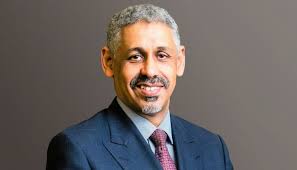Dr Sidi Ould Tah, a renowned economist and national of Mauritania, has been elected as the new President of the African Development Bank (AfDB). He will take over from Nigeria’s Dr Akinwumi Adesina, whose second five-year term as AfDB President ends on August 31, 2025. The announcement was made on Thursday, May 29, 2025, during the Annual Meetings of the AfDB held in Abidjan, Côte d’Ivoire.
Dr Tah was elected by the Bank’s Board of Governors, made up of Finance and Economy Ministers and Central Bank Governors from the AfDB’s 81 member countries, both regional and non-regional. His appointment will take effect on September 1, 2025, and he will serve a five-year term as the ninth President of the Bank.
Dr Sidi Ould Tah is widely regarded as a visionary leader and a seasoned development economist. Until his election, he served as the Director-General of the Arab Bank for Economic Development in Africa (BADEA), where he led major reforms and strengthened Africa-Arab cooperation in economic development. Under his leadership, BADEA’s assets grew from $4 billion to nearly $7 billion, and over 700 projects were successfully completed in 44 African countries, most within three-year cycles.
During his campaign for the AfDB presidency, Dr Tah outlined a clear vision for the future of the Bank. He emphasised the need to move from fragmented pilot projects to large-scale, flagship interventions that span multiple countries. He promised to focus on measurable outcomes, execution discipline, and financial innovation.
He declared that the Bank must not be limited by its current capital. “Under my leadership, the AfDB will not limit ambition to its available capital. I will utilise callable capital, attract private co-financing, and enhance our impact using structured instruments that align with Africa’s needs,” Tah said.
A firm believer in institutional credibility, Dr Tah said he would rebuild confidence in the Bank’s systems through clear fiduciary standards, well-trained personnel, and transparent governance. He added that the next phase of AfDB’s growth must include strategic partnerships with global players. “The next AfDB President must speak to investors in Riyadh, Beijing, and Nairobi with equal fluency. I bring a partnership model built not on aid but aligned capital and shared purpose,” he noted.
Tah’s record at BADEA includes $50 billion mobilised for African development, support for 400 megawatts of solar power projects across 800 communities, and job creation through support for small and medium enterprises (SMEs). His South-South cooperation model resulted in over $6 billion in co-financing, focused on trade, infrastructure, and industrial development.
He said Africa stands at a critical moment in its development journey and called for bold leadership. “This is not a time for experimentation. Africa needs tested and proven leadership that can deliver real results,” Tah stated.
Meanwhile, Nigeria’s Central Bank Governor, Mr Olayemi Michael Cardoso, was named Central Bank Governor of the Year at the 2025 African Banker Awards, held on Wednesday night in Abidjan. The award, presented by African Banker magazine, celebrates Cardoso’s strong leadership and key monetary reforms that have brought stability and credibility back to Nigeria’s financial system.
Cardoso was recognised for his “bold and strategic” approach to monetary policy, including efforts to stabilise the naira, improve transparency in the foreign exchange market, and restore investor confidence. The award committee also praised the Central Bank of Nigeria (CBN) under his leadership for laying the foundation for long-term macroeconomic growth.
Since his appointment in 2023, Cardoso has overseen sweeping reforms aimed at cleaning up Nigeria’s financial system, strengthening regulatory oversight, and restoring discipline in fiscal management. These efforts have attracted positive reactions from local and international stakeholders, with many describing his leadership as a turning point for Nigeria’s economy.
In a statement after receiving the award, Cardoso dedicated the recognition to the people of Nigeria and reaffirmed the CBN’s commitment to financial inclusion, economic stability, and sustainable development.
As Africa transitions into a new phase of development finance, the election of Dr Sidi Ould Tah and the recognition of Olayemi Cardoso point to a renewed emphasis on leadership, transparency, and results across the continent’s key financial institutions.
